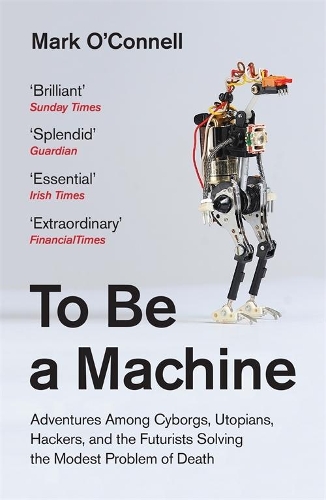
To Be a Machine: Adventures Among Cyborgs, Utopians, Hackers, and the Futurists Solving the Modest Problem of Death
(Paperback)
Publishing Details
To Be a Machine: Adventures Among Cyborgs, Utopians, Hackers, and the Futurists Solving the Modest Problem of Death
By (Author) Mark O'Connell
Granta Books
Granta Books
28th March 2018
1st March 2018
United Kingdom
Classifications
General
Non Fiction
Impact of science and technology on society
Information technology industries
Robotics
599.938
Winner of Wellcome Trust Book Prize 2018 (UK)
Physical Properties
Paperback
256
Width 129mm, Height 198mm, Spine 15mm
183g
Description
Winner 2018 Wellcome Prize
What is transhumanism
Simply put, it is a movement whose aim is to use technology to fundamentally change the human condition, to improve our bodies and minds to the point where we become something other, and better, than the animals we are. It's a philosophy that, depending on how you look at it, can seem hopeful, or terrifying, or absurd. In To Be a Machine, Mark O'Connell presents us with the first full-length exploration of transhumanism: its philosophical and scientific roots, its key players and possible futures. From charismatic techies seeking to enhance the body to immortalists who believe in the possibility of 'solving' death; from computer programmers quietly re-designing the world to vast competitive robotics conventions; To Be a Machine is an Adventure in Wonderland for our time.
To Be a Machine paints a vivid portrait of an international movement driven by strange and frequently disturbing ideas and practices, but whose obsession with transcending human limitations can be seen as a kind of cultural microcosm, a radical intensification of our broader faith in the power of technology as an engine of human progress. It is a character study of human eccentricity, and a meditation on the immemorial desire to transcend the basic facts of our animal existence - a desire as primal as the oldest religions, a story as old as the earliest literary texts.
A stunning new non-fiction voice tackles an urgent question... what next for mankind
Author Bio
Mark O'Connell is a journalist, essayist, and literary critic from Dublin. He is a books columnist for Slate, a staff writer at The Millions, and a regular contributor to the New Yorker's 'Page-Turner' blog and the Dublin Review; his work has been published in the New York Times Magazine, the New York Times Book Review, and the Observer.
